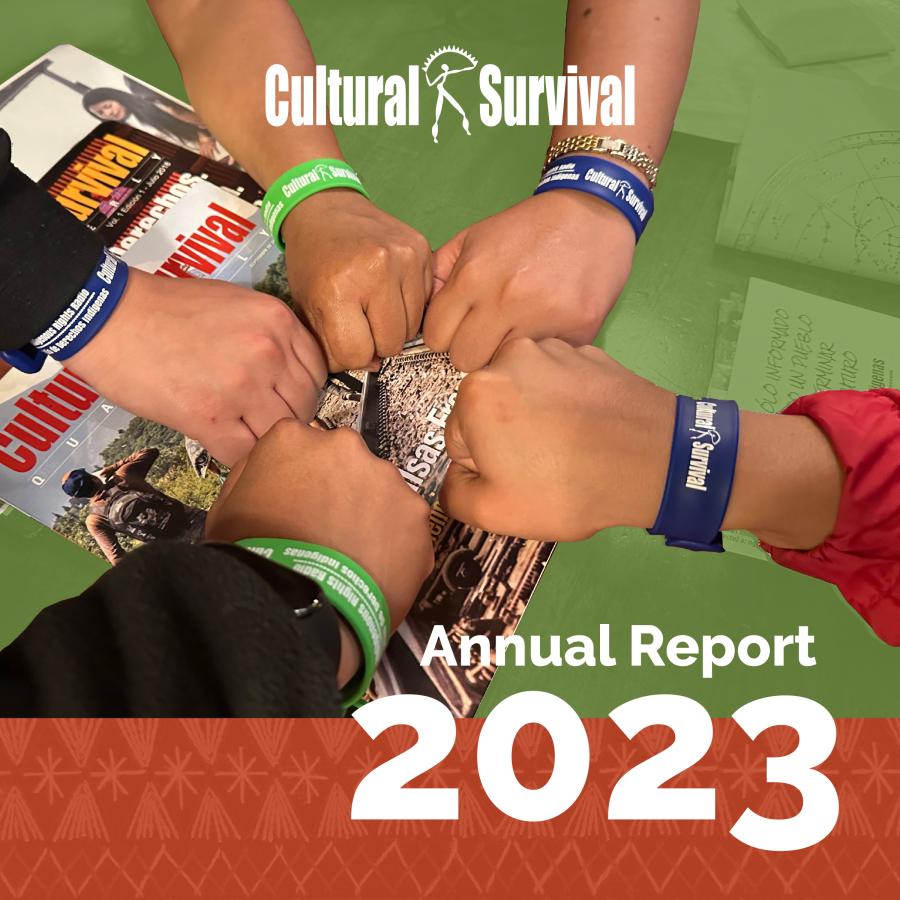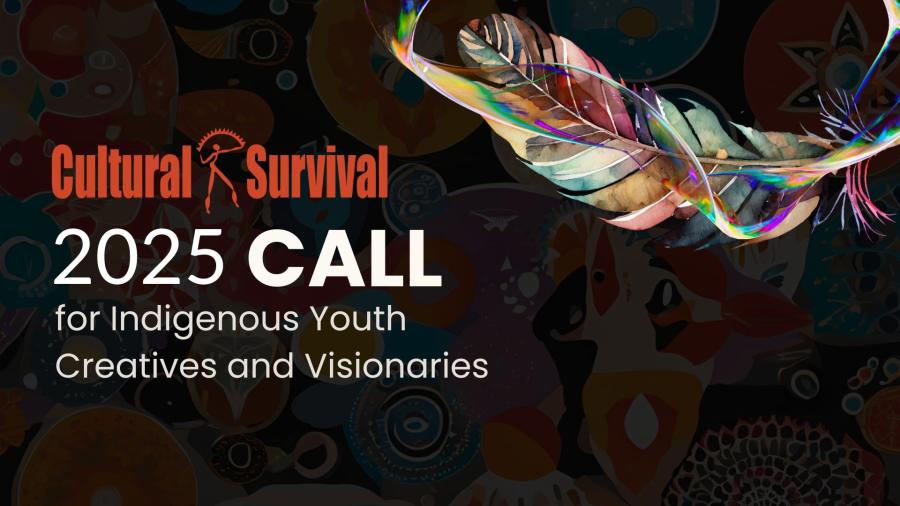
Cultural Survival's 2020 Indigenous Community Media Youth Fellows are hard at work. The Fellowship Project aims to support young Indigenous leaders between the ages of 16-26, who are committed and eager to learn about technology, program development, journalism, community radio, media, and Indigenous Peoples’ rights advocacy. Capacity of the fellows will be built through trainings, community radio station exchanges, and conference attendance.

Lino Tupuk Tsamach Wampash (Sapara) from Ecuador
Lino’s fellowship project titled “Strengthening communication processes for the Tsitsanu school,” aims to build capacity for youth in video and audio production. Facilitated by Tawna Films, Lino organized the first communication workshop of his fellowship with students from Tsitsanu School in the Llanchamacocha community. The training focused on how to represent the culture and cosmology of the Sapara Nation. Youth received instruction in technology to become effective communicators in defending their territory and in sharing their culture with the global community. It was an enriching and joyful process and is one of many workshops the students will be receiving throughout the project term.

Estrella Jhonaí Gutiérrez Vásquez (Mixe) from Mexico
Estrella’s fellowship project entitled “TYIKYËË’NYËM TYIK’Ä’JTSYËM YË N’ÄÄTS YË NKUKOJ” (Taking Care and Feeding Our Roots to Make Them Bloom) aims to strengthen the Ayuujk language. She has completed the first phase of the project, which consisted of workshops with primary school children in the community of Nejapa, Santa María Tlahuitoltepec. Estrella highlighted the history, oral traditions, and land connections of the Ayuujk language for the composition of literary texts in the Ayuujk language. She also created an educational booklet for the children to continue learning Ayuujk. All workshops were recorded to obtain audio from the children for a radio program that will be aired to the community on Radio Jënpoj.

Bryan Edmundo Garces Guatatuca (Kichwa) and Maholy Gabriela Garcés Guatatuca (Kichwa) from Ecuador
Their fellowship project entitled “Wawa Yachay '' aims to promote the Kichwa language among children and youth. Bryan interviewed an elder from his community, Imelda Guatatuca, who has spoken her mother tongue her whole life and is dedicated to the conservation of nature. To hear the interview, listen to an episode on Wawa Yachay online at La Voz de CONFENAIE.

Arnab Chaudhary (Tharu) from Nepal
Arnab’s fellowship project entitled “Vanishing Language of Kusunda People,” is a program series about the Kusunda Peoples promoting and strengthening their critically endangered language and culture. Arnab interviewed the president of Kusunda and local members of the Kusunda village, in Lamahi. On February 21, for International Mother Language Day, he released a special program on the importance of radio promoting mother languages and Kusunda Peoples’ language, to members of civil society, journalist, local representative and lndigenous leaders. A round table discussion was aired on Radio Higway where the first episode of his program was broadcast on five stations. His next episode will focus on the historical and social background of the Kusunda people. Listen to the first episode at Parinati soundcloud.

Virginia Salcedo Rosa (Aymara) from Peru
Viriginia’s fellowship project entitled “Workshops for Youth on the ILO Convention 169 on Indigenous and Tribal Peoples in Indigenous Languages” aims to educate youth in revitalizing and strengthening their rights in Aymara and Quechua. As part of the National Network of Indigenous Communicators of Peru and Pachamama Radio (REDCIRP-Puno), local youth received training on the advances, setbacks and challenges of the Aymara and Quechua language by participating in the first forum on the standardization of Aymara and Quechua. They were introduced to practical tools in writing and reading in Aymara and Quechua to strengthen their cultural identity. Ancestral customs and traditions are fundamental to maintaining cultural identity and affirm the longevity of mother tongues. An overview of sessions from the forum can be viewed at Cultural Survival Vimeo. During the ILO Convention 169 workshop, youth participants reflected on their identity and acknowledged the importance of transmitting their languages from generation to generation and will be developing articles from these reflections. Viriginia also completed a radio spot on the ILO Convention 169 with two youth participants. Listen to Cultural Survival Sound Cloud.

Luis Enrique Amador Tlatilolpa (Náhuatl) from Mexico
Luis’ fellowship project entitled “Creation of Audiovisual Content in Náhuatl” focuses on revitalizing the Náhuatl culture and language to address intergenerational language gap. Luis has been delivering educational material to students in Náhuatl in Xochinanacatlan, Puebla. He also completed a video on the colors of the land and universe in Náhuatl with Spanish translation. This is one of many videos in a series he is creating for the Xochinanacatlan community. Part of his project is to address the challenges of accessing electricity and the internet, and he will be providing a platform for community members to view the videos and will organize mobile cinema streaming of videos. View the video on colors here: In Talpali los colores.
IN TLAPALI los colores | Luis Amador from Cultural Survival on Vimeo.

Carolina Trayen Rain Ancan (Mapuche) from Chile
Carolina’s fellowship project entitled “Strengthening Mapuche Communication in the Budi Territory” is about enhancing community media communication and Mapuche knowledge through oral traditions by using modern audiovisual technology. Carolina has been actively researching and collecting interviews from Indigenous leaders of Budi and has interviewed elders on “nutram” stories, which are traditional stories told by elders. Carolina is also an active member of the Mapuche Film School of Communication where she participated in the 10th celebration of the school, assisting children in learning how to operate video cameras. She will also be producing audiovisual footage and is in the stage of post-production. Stay tuned.

Juan Pablo Jojoa Coral (Quillasinga) from Colombia
Juan’s fellowship project is entitled “Sacred Plants, Traditional Medicine of the Siona, Cofan, Huitoto, and Quillacinga Peoples” aims to protect the sacred ancestral medicine plants of his people. Juan is collecting material and classifying the sacred plants: grandfather tobacco, mother coca, and ayahuasca, and learning about their usage for medicinal and ceremonial purposes. He will conduct interviews in Siona, Cofan and Huitoto villages in the Amazon, in Nariño and Putuymayo. He will be conducting site visits with elders for audio material after obtaining authorization from the leaders of each village. He hopes to produce six radio programs on the three sacred plants. These will be aired on Radio Quillasinga to strengthen the ancestral knowledge among the generations. “This generation has to know that we are from the trees, that our land is the roots, the trunks are the community, and the leaves are each of us,” says Juan.



